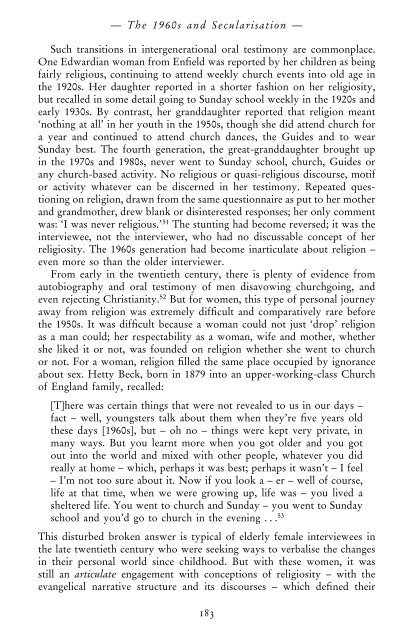The Death of Christian Britain
The Death of Christian Britain
The Death of Christian Britain
Create successful ePaper yourself
Turn your PDF publications into a flip-book with our unique Google optimized e-Paper software.
— <strong>The</strong> 1960s and Secularisation —<br />
Such transitions in intergenerational oral testimony are commonplace.<br />
One Edwardian woman from Enfield was reported by her children as being<br />
fairly religious, continuing to attend weekly church events into old age in<br />
the 1920s. Her daughter reported in a shorter fashion on her religiosity,<br />
but recalled in some detail going to Sunday school weekly in the 1920s and<br />
early 1930s. By contrast, her granddaughter reported that religion meant<br />
‘nothing at all’ in her youth in the 1950s, though she did attend church for<br />
a year and continued to attend church dances, the Guides and to wear<br />
Sunday best. <strong>The</strong> fourth generation, the great-granddaughter brought up<br />
in the 1970s and 1980s, never went to Sunday school, church, Guides or<br />
any church-based activity. No religious or quasi-religious discourse, motif<br />
or activity whatever can be discerned in her testimony. Repeated questioning<br />
on religion, drawn from the same questionnaire as put to her mother<br />
and grandmother, drew blank or disinterested responses; her only comment<br />
was: ‘I was never religious.’ 51 <strong>The</strong> stunting had become reversed; it was the<br />
interviewee, not the interviewer, who had no discussable concept <strong>of</strong> her<br />
religiosity. <strong>The</strong> 1960s generation had become inarticulate about religion –<br />
even more so than the older interviewer.<br />
From early in the twentieth century, there is plenty <strong>of</strong> evidence from<br />
autobiography and oral testimony <strong>of</strong> men disavowing churchgoing, and<br />
even rejecting <strong>Christian</strong>ity. 52 But for women, this type <strong>of</strong> personal journey<br />
away from religion was extremely difficult and comparatively rare before<br />
the 1950s. It was difficult because a woman could not just ‘drop’ religion<br />
as a man could; her respectability as a woman, wife and mother, whether<br />
she liked it or not, was founded on religion whether she went to church<br />
or not. For a woman, religion filled the same place occupied by ignorance<br />
about sex. Hetty Beck, born in 1879 into an upper-working-class Church<br />
<strong>of</strong> England family, recalled:<br />
[T]here was certain things that were not revealed to us in our days –<br />
fact – well, youngsters talk about them when they’re five years old<br />
these days [1960s], but – oh no – things were kept very private, in<br />
many ways. But you learnt more when you got older and you got<br />
out into the world and mixed with other people, whatever you did<br />
really at home – which, perhaps it was best; perhaps it wasn’t – I feel<br />
– I’m not too sure about it. Now if you look a – er – well <strong>of</strong> course,<br />
life at that time, when we were growing up, life was – you lived a<br />
sheltered life. You went to church and Sunday – you went to Sunday<br />
school and you’d go to church in the evening . . . 53<br />
This disturbed broken answer is typical <strong>of</strong> elderly female interviewees in<br />
the late twentieth century who were seeking ways to verbalise the changes<br />
in their personal world since childhood. But with these women, it was<br />
still an articulate engagement with conceptions <strong>of</strong> religiosity – with the<br />
evangelical narrative structure and its discourses – which defined their<br />
183








